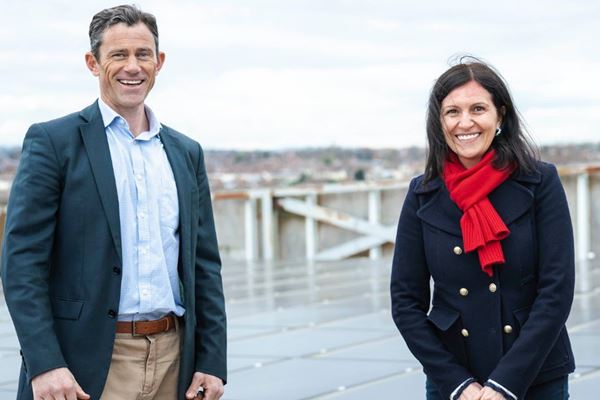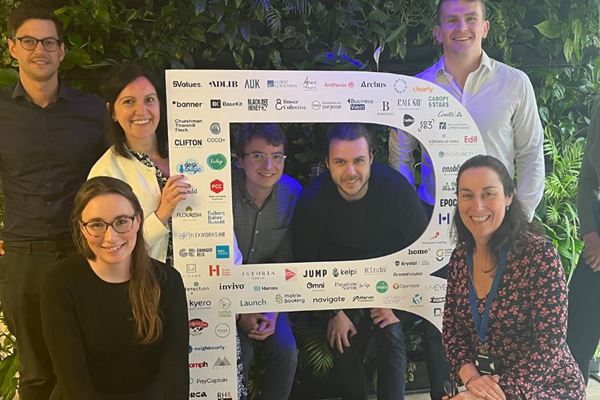Last week, our investment team headed to Birmingham for Solar & Storage Live – an annual exhibition that celebrates the technologies at the forefront of the transition to a cleaner, smarter energy system.
It’s safe to say that this year’s show felt more pertinent than ever, especially given the number of households struggling with their energy bills as a result of the UK’s dependence on dirty and expensive fossil fuels. After three days of insight sharing and relationship building, we’ve come away feeling optimistic about what can be achieved if we pull together and prioritise the deployment of new, cost-effective renewable projects. Below we share our key takeaways from the show.
1. BUSINESSES SHOULD INVESTIGATE ON-SITE RENEWABLES TO ACCELERATE NET ZERO
Data from the British Business Bank found that smaller businesses account for half of UK business-driven emissions, the same proportion as larger businesses. At the same time, they’re also less likely to have the capital and skills required to make the scale of changes needed for net zero. In her panel session, our investment director Monika shared her thoughts on how the industry can better support businesses when it comes to reducing their carbon emissions.
This includes installing their own renewable energy project – for example a wind turbine or rooftop solar array – on their commercial premises. Also known as a ‘direct wire’ arrangement, it means that the business can directly benefit from the clean electricity it generates.
What are the advantages to this? As we’re seeing currently, both consumers and businesses can be exposed to drastic changes in the supply and demand for fossil fuels. On-site renewables therefore offer a solution to managing energy costs in an increasingly volatile marketplace, giving businesses the opportunity to secure long-term, consistent energy prices which are typically cheaper than connecting to the grid. With this in mind, we expect to see a surge in the number of businesses looking to develop their own renewable projects as a way to tackle soaring bills at the same as improve their environmental footprint.
2. WE NEED TO INVEST IN THE GREEN WORKFORCE OF THE FUTURE
A feeling amongst many attendees was that the renewables industry is facing an unprecedented skills shortage, especially when it comes to recruiting young talent. From engineers and installers through to designers and IT technicians, we must prioritise education and create opportunities so that the next generation feel empowered to take their place in the evolving green economy.
At Thrive, we hold annual open days and encourage communities to come along and find out more about renewable energy, how it’s helping lower household bills and why it’s fundamental to meeting the UK’s net zero ambitions. In September, we saw 500 people descend on our wind farm in Bristol and it was great to speak to some budding engineers of the future about how the turbines work and their role in tackling the climate crisis. We also run an internship programme which aims to give university students useful insight into the renewables industry so that they can go on to thrive in green careers.
3. BUILD RESILIENT AND SUSTAINABLE SUPPLY CHAINS
There was also a lot of discussion about supply chains and the need for sustainable procurement, including a very insightful panel session led by Chris Hewett from Solar Energy UK. Chris talked about the company’s Solar Stewardship Initiative (SSI) which it has recently launched with SolarPower Europe. The initiative is being designed to further develop supply chain transparency and strengthen confidence in how, where, and by whom products and solar components are manufactured.
At Thrive, we pay very close attention to our supply chain and collect information and data to improve our decision making and evaluate our suppliers. The global supply chain for solar panels and batteries is a particular focus for us as we continue diversifying our portfolio. We have been working with suppliers and external experts to identify panel manufacturers who, to the best of our knowledge, are not operating in the areas implicated in modern slavery allegations.
We have also commissioned third party experts to review the provenance of rare earth minerals used in the manufacturing of batteries and the human rights practices in their extraction. Our procurement includes environmental, social and governance criteria upon which tenders are evaluated. By incorporating these ethical and environmental criteria into our procurement processes, we hope that suppliers will see the value in improving their practices.



